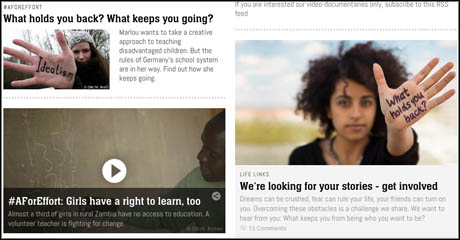
Social media, digital communications and mobile technology all allow journalists from one side of the world to reach sources on the other, but the possibilities are not always explored to their full potential.
At German broadcaster Deutsche Welle, a new project launched at the start of this year is looking to engage and empower voices on a global scale, and give the audience an active role in the process.
"It's our belief that listening is at the very core of journalism," said Fabian von der Mark, who runs the Life Links project for Deutsche Welle, "it makes no sense to come to the field with your own ideas and grab their examples to prove your thesis."
These principles are at the core of the project in telling readers' stories around set topics over a four-week period, Von der Mark said today at the International Journalism Festival in Perugia.We try to find an angle that was voted on by the communityFabian von der Mark, Deutsche Welle Life Links
Built around the question 'What holds you back?', audience members are asked to contribute their thoughts and experiences through an online form. The Life Links team identify themes in the contributions and post a survey to the site to ask what will be covered next.
"Episodes or topics always last for four weeks on the website," Von der Mark said, "and after two weeks of the four we have a TV documentary which is the climax of the project.
"We try to find an angle that was voted on by the community, we research on the hashtag and then have the reporters sent out to meet people with the problem."
Life Links is in the final weeks of its #AForEffort topic on education, detailing the experiences, thoughts and challenges of three teachers in Germany, Bulgaria and Zambia.
As a rule, every topic must include a subject from Germany, Europe and somewhere around the world, but the four-week period has also included interactive explorations of global education, opinion pieces and interviews.
In one case, for #DrugTrap this meant tracing the cocaine production process, interviewing a producer in Venezuela, an imprisoned dealer in Germany and a woman attempting to stay sober in Finland.
In #HeadAboveWater, the Life Links team interviewed a young German fisherman, a Dutch "seafarer" and a Bangladeshi workman who dismantles ships with nothing but a blowtorch.

Screenshot from Life Links, Deutsche Welle.
"Right from the beginning, when people get to know the topic, the entire process is transparent," Von der Mark explained, as reporters and audience members share their opinions around the hashtag.
Some topics can be controversial though. As part of the very first topic stream, #WhoAmI, reporter Gönna Ketels travelled to a camp on the outskirts of Paris to visit a Roma community.
Gönna shared a cup of tea and watched television from the bed of Alina, a Roma woman who called the camp home, but large parts of the industry reacted negatively.
"For the older generation of TV journalists it was unimaginable to get that close to the subject," said Von der Mark. "It was really disturbing for some people but it shows in a great way what we have reached and what reporters we have."
The key in reaching these diverse and often under-reported communities is in sending reporters who are modest and humble, he said, allowing the subject to open up and speak for themselves.You cannot offer something today which is strictly one-way communicationFabian von der Mark, Deutsche Welle Life Links
"We don't want to have a 'Hey! TV is coming! Here I am!' [approach], and then leave again," he said. "We pick those [reporters] who have an honest interest in the people they meet."
Inspiring a community to be involved can be difficult as well, he said, especially when starting out, and Life Links are lucky to draw on the Deutsche Welle's network of contacts.
Social media has, naturally, been central in expanding that network further though and Von der Mark wants to get to the point where "the map is filled" with markers for interviewees and subjects for each topic.
And he also wants to continue building an audience outside Europe and the Americas, seeing the level of engagement and interaction as an essential part of modern, digital journalism.
"You cannot offer something today which is strictly one-way communication," he said.
Free daily newsletter
If you like our news and feature articles, you can sign up to receive our free daily (Mon-Fri) email newsletter (mobile friendly).
Related articles
- Audiences, AI and audio apps: five talking points from Perugia
- Deutsche Welle is working on a tool that makes it easier to tell stories in virtual reality
- How the Reveal Project aims to help journalists verify eyewitness media
- Everything you need to catch up on news:rewired
- New DW app will have geolocated push alerts for eyewitness media









